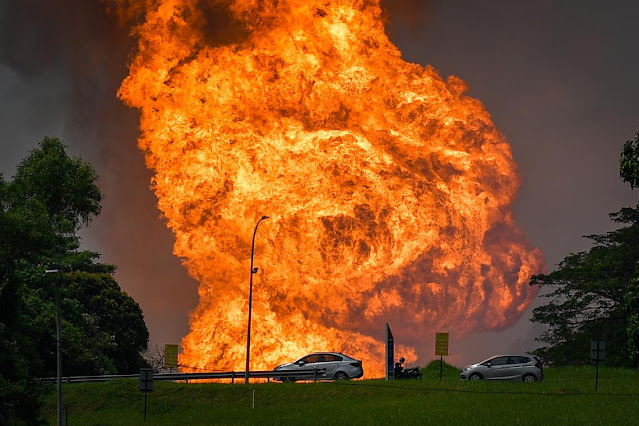On April 1, 2025, a catastrophic gas pipeline explosion struck Putra Heights, a suburb of Kuala Lumpur, Malaysia, sending shockwaves through the community. The explosion created a massive fireball, injuring at least 145 people, including children, and causing extensive damage to homes and vehicles. Beyond the human toll, the incident is expected to have significant economic repercussions.
The Incident
The explosion originated from a Petronas-operated gas pipeline, triggering an inferno that sent flames soaring up to 20 stories high. The sheer force of the blast left a large crater near a residential neighborhood, with residents reporting powerful tremors that shook their homes.
Casualties and Damage
Health Minister Dzulkefly Ahmad confirmed that 67 individuals are receiving treatment in public hospitals for severe burns, while 37 others sought medical care in private facilities. The disaster also ravaged 190 houses and 148 vehicles, displacing many families who are now in urgent need of assistance.
Government and Emergency Response
Authorities swiftly secured a 290-meter perimeter around the explosion site as investigations into the cause continue. Prime Minister Anwar Ibrahim visited the devastated area, assuring residents that the government and Petronas would take responsibility for rebuilding damaged homes, a process expected to take several months.
Economic Impact
The explosion has disrupted gas supply networks, potentially affecting industries dependent on natural gas. Experts predict temporary shortages and price fluctuations, which could impact manufacturing, energy production, and transportation sectors. Additionally, the financial burden of reconstruction—both for infrastructure and affected households—could place strain on government and corporate budgets. Investors are closely monitoring the situation, as confidence in Malaysia’s energy infrastructure may be shaken.
The real estate sector in the affected area may also experience declining property values due to safety concerns, while local businesses suffer revenue losses as operations remain stalled. Insurance companies are likely to face substantial claims, further influencing financial markets.
Safety Concerns and Lessons Learned
This disaster underscores the urgent need for stricter safety regulations and frequent inspections of gas pipelines to prevent such tragedies. As investigations unfold, there is growing pressure on authorities to enhance infrastructure safety and hold responsible parties accountable. The economic fallout of this event could serve as a wake-up call for energy companies to prioritize long-term safety investments.
Stay updated as more information emerges about this unfortunate event.
.jpeg)

.jpeg)
.webp)

No comments:
Post a Comment